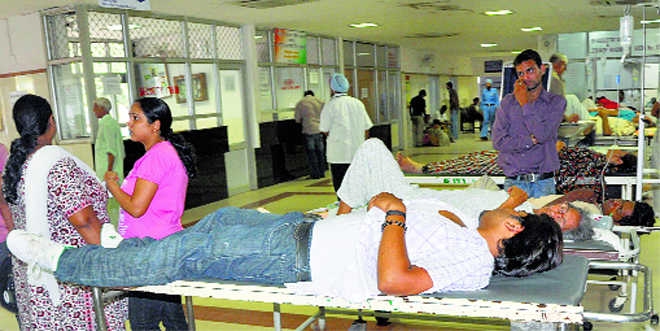
GS Grewal
Ex-president, Punjab Medical Council, Member, Core Committee, Alliance of Doctors on Ethical Healthcare
Noble intent behind the medical insurance scheme announced by Union Finance Minister Arun Jaitley in his Budget speech notwithstanding, the scheme is most unlikely to benefit the common man. Rather, it is likely to be abused if some other measures are not taken simultaneously. Given the experience, the scheme runs the risk of being abused by unscrupulous elements who have already commercialised the medical profession. The scheme may end up benefiting big corporate hospitals only, while the common man, for whom it is aimed, will be left high and dry.
The scheme will not serve its purpose if the prices of the inputs are not regulated and a cap is not put on these. Given the current rate at which the hospitals charge the patients for everything, Rs 5 lakh may seem to be peanuts.
What is required is an effective and rigorous control over the prices of the inputs: medicines, equipments, implants, hospital stay, diagnostics etc. Last year, the Government of India had taken a revolutionary measure by capping the prices of stents. The prices had been reduced by as much as 200 per cent. But did the actual benefit reach the patients? The answer is a big no. Because unscrupulous elements in the medical profession, particularly those running big corporate entities, have raised the costs of other things. The patient, who should otherwise have got massive benefits, either gets no benefit or just a meagre benefit. Thus, a noble measure was eventually wasted.
The medical insurance scheme is likely to meet a similar fate. The corporate hospitals, which are already empanelled with the government, will misuse the scheme. An unsuspecting patient may get admitted in such hospitals under the impression that his costs are covered. But for a corporate hospital, Rs 5 lakh virtually means nothing. Otherwise, Rs 5 lakh is a handsome amount and can adequately cover serious health problems like heart or brain surgery. However, it will not hold true about the corporate hospitals which are notorious for charging exorbitant fees and dues from the patients. Only a few months ago, a parent was made to cough up a whopping Rs 17 lakh for the treatment of his eight-year-old daughter. Even this much of expenditure could not save his daughter.
Under these circumstances, we need effective regulation and control of the inputs which are needed for the treatment. First and foremost, we need to control the prices of the medicines, which are the basic requirement for any treatment. Given about four decades of medical practice, one can see the massive gap in the actual manufacturing cost of the medicines and the prices these are sold to the patients. One has seen a price variation of 1,000 per cent in the prices of medicines with the same salts. The patient, under the belief that "the costlier the drug more effective it might be", can never smell or suspect the fraud that is being committed on him. And if his medical costs stand covered, even if to a certain limit only, he will not bother. The loss will be that of the government and, consequently, the people also as more patients can otherwise be covered if the insurance money is genuinely spent by keeping the input costs under control.
There is a large section among the medical fraternity which believes in ethical practices. But in the present day competition driven by advertisements, a genuine doctor will find it difficult to survive professionally. If he prescribes genuine medicine which is genuinely priced (read less priced), he may end up losing his practice and patients as most of the patients are still under the belief that the costlier medicines are better and more effective.
In fact, people have to still carry the corpse of their dear one on their shoulders or cycles, for lack of ambulance services which is a national shame for human dignity.
Now that the medical insurance scheme has been announced, the government must couple it with strict price regulation of the input costs. This will strengthen the scheme and help provide complete and better treatment to patients within the stipulated amount. Otherwise, what will Rs 5 lakh mean for a corporate hospital that charges Rs 17 lakh for unsuccessful dengue treatment?



























